Giving the gift of gold
April 28, 2016
The air of the Boston Children’s Hospital corridor is thick with the odor of bleach and sterilized equipment. The muffled sound of the televisions from the different rooms resonates throughout the hallway: soap operas, cartoons and current events being discussed on ABC News.
The slate grey and black checkered floor complements the ivory polystyrene tiles on the ceiling, while the alabaster lighting highlights scrapes and dents on the walls from the gurneys that have bumped into them over the years.
Painted murals envelop the labyrinthian walls. Scenes of animals and athletes, created with bright colors, endeavor to instill a sense of happiness in the young patients despite the unsettling setting. Yet the smell of hand sanitizer still lingers in the air and the sound of pervasive machinery keeps the young patients awake at night.
The Boston Children’s Hospital started as a 20-bed facility at 9 Rutland Street in Boston’s South End. More than 130 years later, the hospital has become a leader in child health care. Glen Rock High School senior Juliana Roddy took it upon herself to combine her knowledge of the hospital and her interest in sewing in order to create and perform her Girl Scout Gold Award.
Roddy’s familiarity with the hospital did not come by chance. She was inspired by her brother’s extensive journey to a kidney transplant in January of 2014.
“Over the last few years, I have become familiar with the hospital atmosphere and feel that something as small as a handmade pillowcase could brighten the patient’s day,” Roddy said. “Although the hope is that the physical pillowcase brings a small sense of joy to the child, it is just as important to let them know that another child took the time to make this for them and is hoping for their recovery.”
After 91 hours of volunteer work and dedication, Project Pillowcase was complete and the patients at the Boston Children’s Hospital had something to brighten their rooms, not just the murals in the hallways.

Photo Credit: Juliana Roddy
A long journey
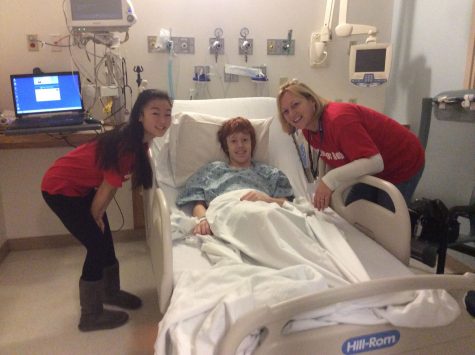
Chris underwent a kidney transplant on January 30, 2014
Chris Roddy was no stranger to hospitals. He was accustomed to the sight of people racing up and down the meandering corridors. He was used to the perpetual sound of beeping monitors and machines. He was nearly noseblind to the smell of antiseptics wafting through each room. He often felt away from home. However, that didn’t make it any easier.
Chris was diagnosed with hydronephrosis at birth, which is the swelling of the kidneys due to a buildup of urine.
In the fall of 2013, Roddy’s condition worsened and he was unable to attend school. The winter months began to creep up on the crisp autumn days. The sun struggled to shine through the thick layer of clouds that hung over the dull, grey-hued sky.
On January 1, Roddy left for Boston, where he spent the majority of the month in the hospital. Days were no longer filled with school, golf and friends but rather doctor visits, procedures and endless testing. Time was split between the hospital, dialysis and the family apartment in Boston.
Inside the apartment, the television screen streamed episodes of Modern Family and Psych constantly. Endless amounts of cards and gifts festooned the once unfamiliar space. Muffled sounds of the shows distracted Roddy from the idea of a kidney transplant but only for a little. The X-Box was always in use: an escape from the stressful days endured by the young eighth-grader.
On the morning of his first dialysis session, Juliana wheeled Chris down just as a proud big sister would. This marked the beginning of a remarkable journey.
The first hurdle arrived: Chris was ready to have both of his kidneys removed. The sun pierced the darkness as night turned to day The sunlight tinted the clouds pink and the rosy hue filled the morning sky. Roddy was wheeled into surgery promptly at 7:30. After a grueling 10 hours, both kidneys were removed and Chris was prepared to receive his father’s kidney in a few short days. Dialysis continued just as the waiting did.
The sun rose once more, but this time it was Chris’s fourteenth birthday. While he sat through his final dialysis session, the entire room erupted in “happy birthday!” Staff, patients and family members joyously flooded in to celebrate. Chris was surrounded with balloons, gifts, birthday cake, cards and even a personalized Derek Jeter jersey. In less than 24 hours, though, he was going to receive the gift he had been long awaiting: a kidney.
Chris settled into his new hospital room and stuck the mundane walls with WWE Fatheads. His next opponent would truly be a wrestling match.
Emotions circulated the anxious atmosphere on the morning of January 30. Family members began to arrive wearing red in honor of Chris. 224 miles away, the students of Glen Rock Middle School and Glen Rock High School were also wearing red to show support for Chris as he embarked on his brave journey.
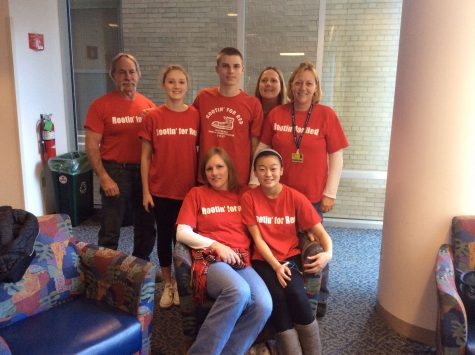
Roddy’s family was a significant support system throughout the entire procedure
Roddy and his father were separated through the sea of red shirts. The sound of the gurney rolling down the hallway into the operating room solidified the events occurring.
After hours of restless waiting, both Chris and his father were out of surgery and doing well. A feeling of great relief engrossed the waiting room. The worst was finally over.
The following months were spent with check ups, small recovery procedures and tying up all the loose ends. A new life was ahead of the Roddy family.
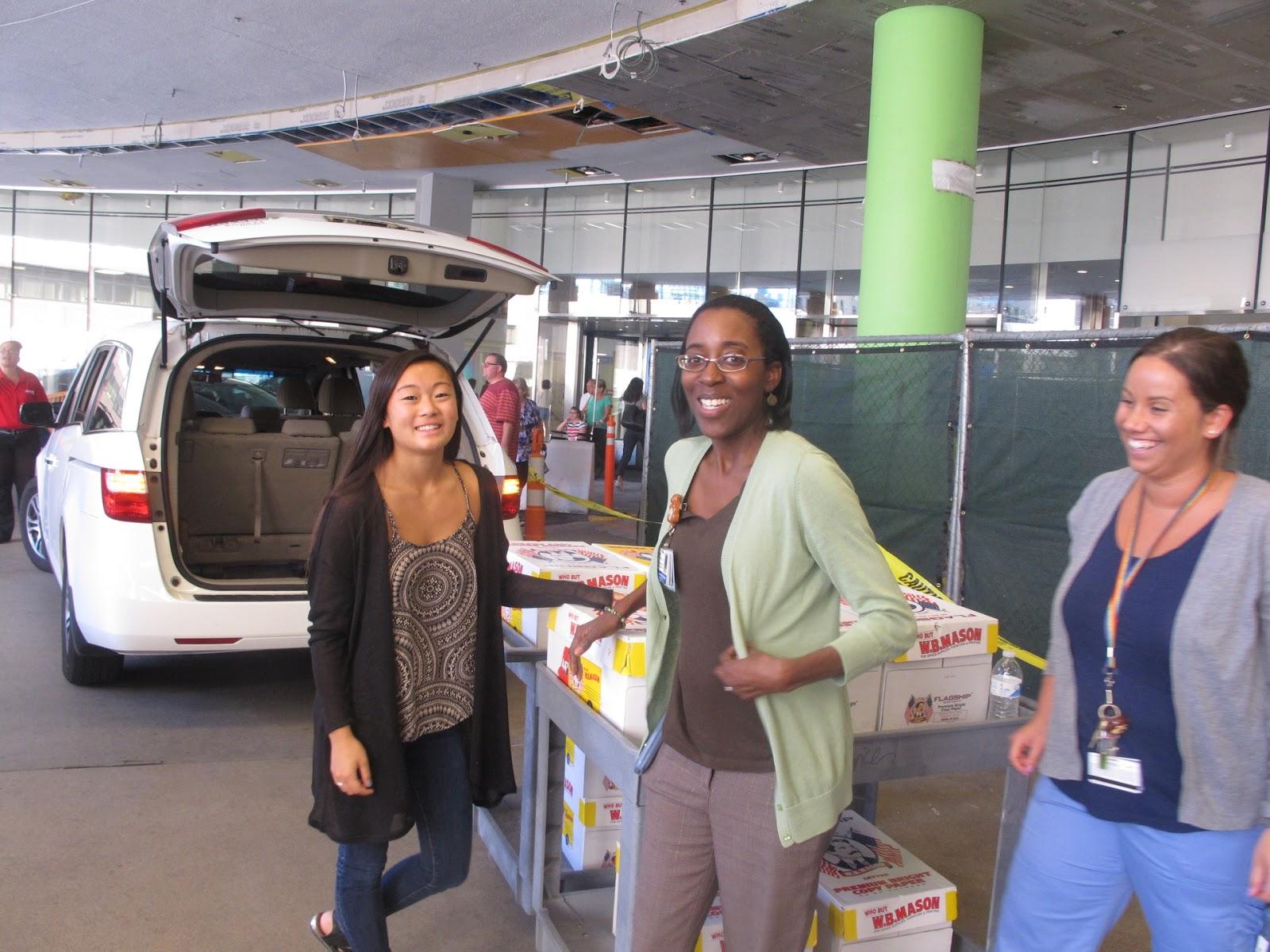
Photo Credit: Juliana Roddy
Project pillowcase
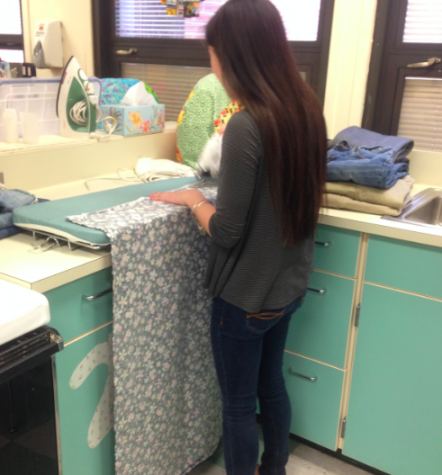
Roddy used the home economics room in the middle school to make her pillowcases
The home economics room is filled with young children scrambling to finish their pillowcases. Fabric, draped all over the room in different patterns, is sprawled across the tables. The smell of hot irons flourishes throughout the room as the wrinkles are gently removed from the material before being stitched together piece by piece. The sound of needle bars being driven up and down send out an echo, puncturing the fabric each time to create a new stitch. As the pillowcases finally take form, the look of accomplishment is draped across the student’s faces.
“Most people have no idea what’s involved in boy or girl scouting,” said Mrs. Jean Urmstrom, the home economics teacher at Glen Rock Middle School. “It’s not just camping, some troops never do that! It’s a good way to meet new people that you wouldn’t ordinarily get to know or work with, and you get opportunities you might not otherwise experience.”
Urmstrom was a Girl Scout Leader in Glen Rock for 12 years as well as the Service Unit Manager for Glen Rock for several years. She worked as Roddy’s project advisor for her gold award.
“Juliana is incredibly motivated and really didn’t need my help at all! As the person who she chose to be her ‘sponsor,’ I knew my role would be minimal,” Urmstrom said. “Juliana spoke to me about what she wanted to do for her project and how she planned to go about getting it done.”
As troop leader, Urmstrom watched six of her girls complete their awards.
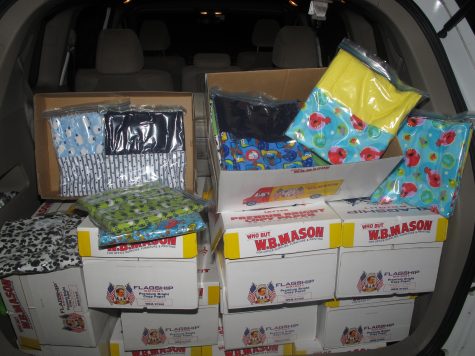
Juliana utilized the Glen Rock Middle School sewing club as well as other volunteers to assist in making the pillowcases
“Girl Scout Leaders can’t help members of their own troop with their Gold Award projects. I did assist another girl with her project years ago,” she said. “She put on a fashion show and raised money for a women’s shelter. I had a lot of experience in running functions like that, so I was able to make a lot of recommendations to make it run smoothly.”
To begin her extensive project, Roddy met with Urmstrom to discuss the details of the pillowcases such as size, material and volunteers. She also met with LaKeisha Garcia, a child life specialist at the Boston Children’s Hospital to see if her plan could be accommodated.
“The goal of the project was not only to impact the recipients of the pillowcases, but also the people who are producing them,” Roddy said. “Sewing has become less popular over the years and has been gradually reduced in the Family and Consumer Science Project due to curriculum changes; my hope is to introduce this to students, elementary through high school, so they can be exposed to and acquire this skill.”
Part of the sixth grade family and consumer science curriculum at Glen Rock Middle School is making pillowcases. The students have the choice keeping the pillowcase, giving it as a gift or donating it to a child with a serious illness. The organization that the class donates to is called “Conkerr Cancer”, which was started by a mother whose son had bone cancer.
“The more people who know about it, the more pillowcases get donated,” Urmstrom said.
Roddy had a multitude of middle school as well as high school volunteers eager to help out and assist in making pillow cases for a great cause.
“I was able to help out constructing the pillowcases. I was also able to supply some of the fabrics. Some of my 6th graders were able to help out as well by ironing and pinning fabric, and some of her friends helped with cutting the fabric, which was the most time consuming part,” Urmstrom said. “The Girl Scouts and Boy Scouts as well generally help each other with their projects, and those experiences are really beneficial to everyone in the troop.”
“Learning from one of the younger boys that coming after school to help me make the pillowcase really ‘made his day’ was inspiring. He got fulfillment knowing that his work was going to benefit another child,” Roddy said. “This really helped drive home the point of the project and showed me how it truly was making a difference. I think the motivation behind the volunteers is what really enabled me to exceed my goal and what really was the biggest success.”
Roddy set a goal of 100 pillowcases however due to the significant help from volunteers and students, she was able to exceed this.
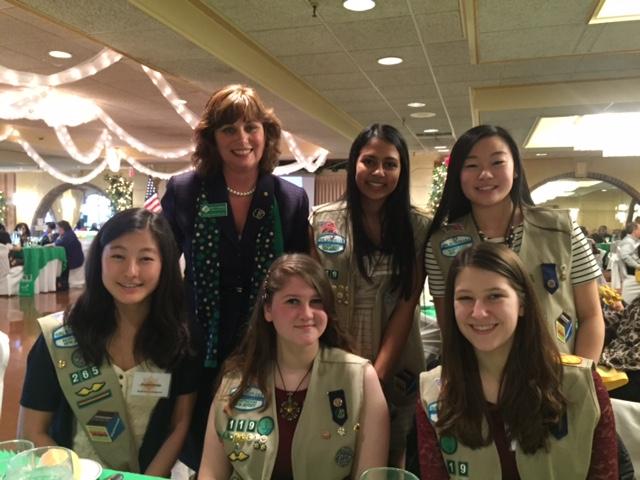
Photo Credit: Juliana Roddy
The next step
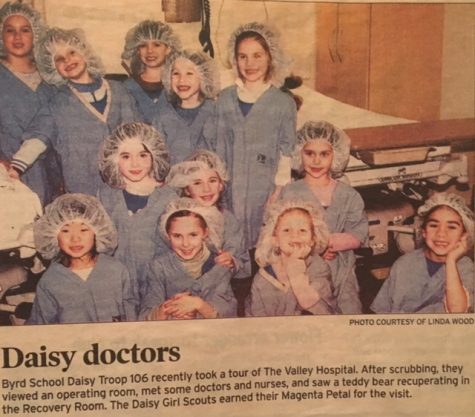
Roddy (front, far left) with her Daisy troop in 2004
The warm June air fills the room and the sunlight seeps through the window. After 13 years as a girl scout, Roddy prepares to transition to the next phase in her life.
The church hall is filled with family, friends, mentors and public officials. At the front of the room, sit a row of high school senior girl scouts dressed in white. Separating the audience from the girls is a bridge; the same bridge that they used to graduate from daisies to brownies, brownies to juniors and thus forth.
The Girl Scout Gold Award was introduced in 1980. The goal of the project was to assist young girls achieve skills in four separate areas: skill development, leadership, career exploration and service.
Patricia Christie, the awards program manager at Paramus Service Center, has been involved with the Girl Scouts of Northern New Jersey for over 12 years. Prior to that, she was a troop leader for her oldest daughter 28 years ago. As the awards program manager, Christie is responsible for expediting the girls’ award experience. This includes training, guidance, mentoring and evaluating the final outcome.
“I believe in the benefit of a “girls-only” experience. Girl Scouting is a place where girls can be themselves, explore new ideas and skills and take the lead,” Christie said. “Coming from an all-girl high school, I had a clear understanding of this concept.”
The Girl Scout Gold Award recognizes leadership, effort and impact. Only six percent of eligible girls nationally complete their gold awards, making it an extremely prestigious award.
At the GSNNJ council, the percent of girls who follow through with their awards is higher; 8.5 percent of eligible girls are awarded their gold award.
“It’s a good percentage but anything less than 100% means there are girls who are missing out on a great opportunity to grow with the program,” Christie said.
One of the major challenges in completing a Gold Award is time management.
“Juggling the time needed for the experience with all of a girl’s other activities is tough. It’s been my experience that the girls who pursue this award are involved in many other activities,” Christie said. “They are the ‘doers.’ Girls today are extremely busy and it can be a great challenge to fit everything in.”
It is also essential that the girls take time to choose a community issue that truly matters to them. Passion is the ultimate catalyst to any successful gold award.
“The projects that resonate with me the most are the ones where I can feel the passion the girl has for that community issue. I have watched girls develop passions that I know will last them a lifetime. The skills that girls develop working on a Gold Award will set the stage for not only personal success but that girl becomes a community member who knows how to take action to make the world a better place,” Christie added. “They are developing leadership skills, networking skills, and project management skills and will have a better understanding of who they are as a person and what they bring to the table to work with others and be a productive citizen.”
When choosing a community issue to work with, many girls are inspired by other girl scouts and other projects that they have researched. They can also be influenced by community tragedies or repetitive problems.
“For example, when we experienced hurricane Sandy, many girls turned their attention to issues that related to the disaster relief, preparedness and environmental issues that resulted,” she said.
A major goal of Girl Scouts is to help a girl find her strength, confidence and character so that when she enters the real world, she is prepared to be herself and make a difference.
“If she has experienced our program, a girl will go out into the world with a ‘toolkit’ of skills that will aid her as she pursues higher education, a career and as a contributing community/family member,” Christie said. “She will have an understanding of the power that she possesses to take action in the world.”
“Put time into discovering who you are and what truly matters to you. The ‘bumps in the road’ are gifts. You learn and grow so much more from them. Don’t give up when the challenges hit. Take advantage of the support council offers and push past to the greatest reward, your own personal growth.”
“This journey has taught me what it is like to lead a project from start to finish, work with others and truly understand the rewarding feeling of accomplishing a goal,” Roddy said.
Juliana will be studying nursing at the University of Pennsylvania in the fall.
